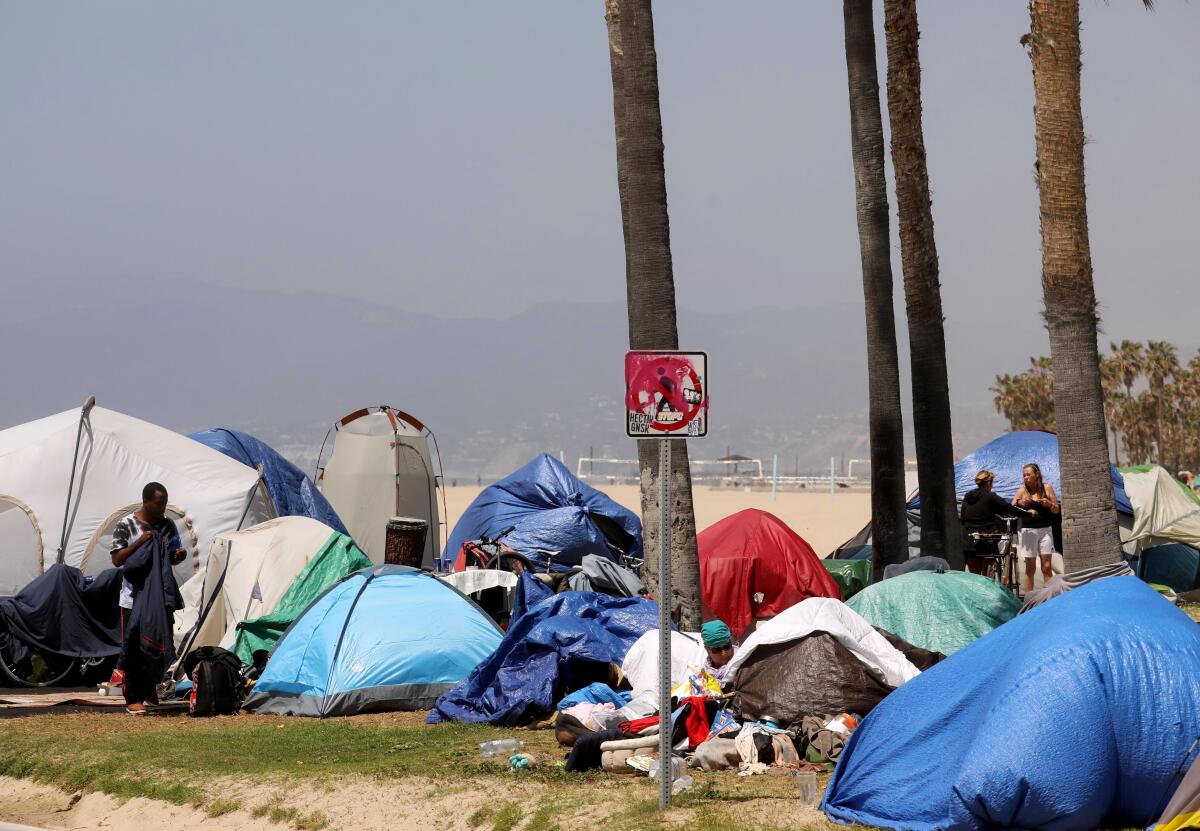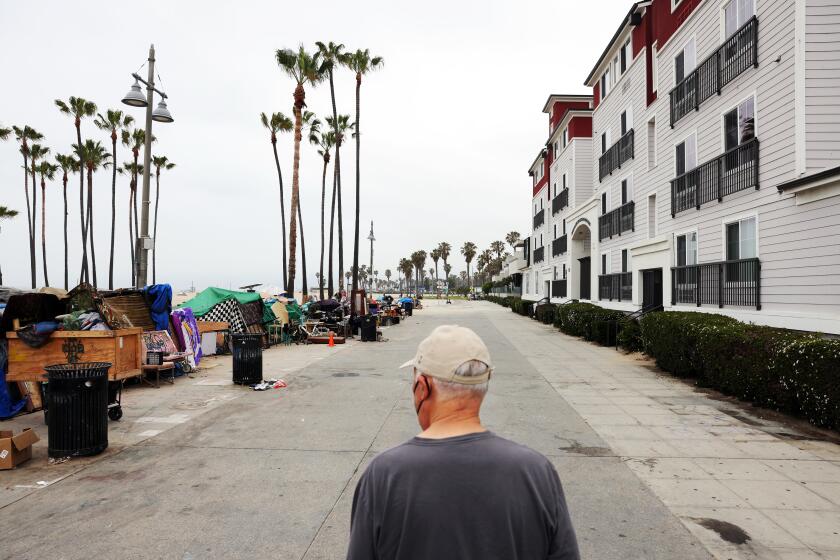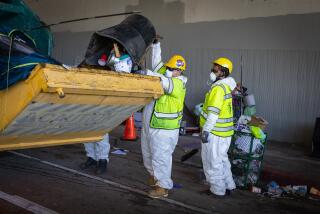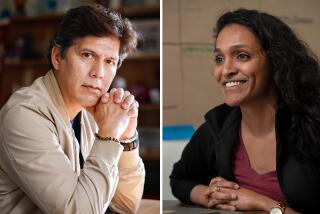Column: The homeless situation in Venice is complicated. But that’s no excuse for inaction

Los Angeles City Councilman Mike Bonin, who finds himself at the center of a raging storm over homelessness in his district, isn’t surprised that so many of his constituents on the Westside are livid.
“Anybody who’s not angry at what they’re seeing on the streets is just dead inside,” he said. “I walk down the street and my blood boils.”
Recently, I wrote about a couple who have lived above the Venice boardwalk for years. They said their neighborhood has grown increasingly unsafe, with sprawling encampments, trash, fires, drugs, violence and obvious cases of severe, untreated mental illness. And like countless others, they didn’t have much nice to say about their city councilman, so I thought I should give him a chance to explain himself.
Nobody should be living outside, Bonin told me at the start of our conversation, addressing criticism from those who think he’s content to have unlimited numbers of homeless people bed down at the beach, in parks or in parking lots. In a nearly two-hour interview, he acknowledged his office hasn’t kept up with a flood of appeals for help from angry constituents. He said he wishes he had done more on homeless relief, especially in the areas of master-leasing hotels and taking advantage of shared housing.
In recent years, the boardwalk has become an open-air clinic for poor residents, people struggling with addiction and those in physical or mental distress.
He also acknowledged that the bridge housing facility he pushed, over fierce objections from those who said it would only make matters worse, got off to a rough start. But he attributed that to “a perfect storm” of legal constraints and pandemic-related hurdles.
And he said he wishes L.A.’s response to homelessness wasn’t so balkanized and screwed up, repeating his earlier call for a city-county consent decree in which a judge would oversee a more focused effort, with benchmarks in place to mark progress, and no excuses for lack of progress.
But would we really need that if public officials would pull together to do the jobs they were elected to do?
“It ain’t happening,” he said.
Venice, by nature of being Venice, has always been a draw for both people of means and people on the margins. But in recent months, things have gotten out of control there, a fact driven home by the fact that at the border with Santa Monica, you don’t see many tents or much of the suffering, crime and disorder that have become commonplace in Venice.
It’s easy enough to argue that Bonin could have and should have done a better job, and I get why there was an uproar over his proposal to temporarily move encampments to parks and to beach parking lots, just as summer rolls in. But it’s not Bonin’s — or his district’s — responsibility to solve this alone.
I say they should load the tents and the people in Venice onto buses and deliver them to parks in the San Fernando Valley district of City Councilman John Lee. In April, Lee proposed yanking funds for a homeless housing project in his own district, despite full council approval more than a year ago.
The same morning I spoke to Bonin, Councilman Joe Buscaino and L.A. County Sheriff Alex Villanueva made appearances on the Venice beach walk. Buscaino, a former LAPD officer who’s running for mayor, said it’s time to crack down on tents in public spaces and make the city safe for everyone, and as if on cue, a homeless woman with a knife was arrested and the councilman was hustled away by armed security guards.
Villanueva, wearing a cowboy hat, ripped local officials and said it’s time to “properly regulate public spaces.” Sure, we need to enforce the law. But this is a guy who seems incapable of regulating his own department, with its history of deputies running amok and a state probe into possible civil rights violations.
There is a place in this conversation, as Villanueva and Buscaino said, for stepped up enforcement of existing laws, not just for the sake of those who are housed but for homeless people themselves, who are routinely the victims of assault. But the more important piece, in Bonin’s mind, is to step up outreach and create more housing of every type, and he said more help is on the way from Sacramento and Washington.
I checked in with two longtime homeless people with mental health challenges last week for their thoughts. Virginia told me she’s now moved into the bridge housing in Venice after being in a beach tent, and she’s doing well. Suzanna, whom I wrote about in October, told me she’s moved from temporary housing in Venice to a long-term setup in Baldwin Hills.
Both of them told me the key to coming indoors was that teams of outreach workers — from PATH, the St. Joseph Center and the People Concern — reached out to them, worked with them and stuck with them.
As for Bonin, he now has a plan to gradually remove the tents from Venice Beach and find housing for everyone, as my colleagues Doug Smith and Benjamin Oreskes reported recently. I and many others will be standing by, waiting to see if it works.
One thing in particular that Bonin said stuck with me after our conversation. He said he’s going to keep doing what he can, but he doesn’t manage the foster care or mental health systems, and he didn’t create the meth epidemic. Neither did he reign over the long, sordid history of housing discrimination in Los Angeles, nor did he design the post-industrial L.A. service economy in which housing costs soared while wages flattened out.
He has a point. This problem goes way beyond removing some tents from the beach, but that is no excuse for inaction. So what can we do?
First, in a county with more than 60,000 homeless people, luxury housing developments fly through the approval process. It would be nice if, given an affordable housing shortage of roughly half a million units, our elected officials would act with the same level of urgency and efficiency to address that need.
Second, a few weeks ago I wrote about the downtown L.A. Clean Team — formerly homeless people and ex-cons who clean the streets and rebuild their lives in the process. Given the trash problem in L.A., and the number of homeless people who could use a job, why don’t we have these programs in every single council district?
The answer is that a bill to expand such programs, co-sponsored in 2017 by Buscaino, is gathering cobwebs at City Hall. Yes, I said 2017. Do we have to wait another four years before someone slams a fist on the table and gets this thing moving?
Third, almost two years ago I went to Italy with three dozen local officials and nonprofit executives to study an acclaimed mental health program with plans to start a pilot in Hollywood. All this time later, with neighborhoods serving as outdoor asylums and multiple daily homeless deaths, it’s still in the planning stages and the L.A. County Board of Supervisors has yet to approve it.
A reader in Hollywood by the name of Murray has been beating me up for not pounding a drum and demanding to know what’s going on. I sometimes bristle at his constant barbs. But Murray is right. If the Trieste model can save lives, it ought to be up and running.
I’m told that the pilot has stalled in part because of shifting priorities during the pandemic, along with a change in its funding bureaucracy. If it doesn’t get on track soon, Murray and I are going to raise hell together.
But getting back to Bonin’s point, at the street level, local officials are neck deep in a flood, and they can’t reach far enough upstream to turn off the spigot.
California has the world’s fifth-largest economy and the nation’s highest poverty rate, and yet state lawmakers, in the face of a crushing housing crisis, have failed time and again to come together on legislative remedies.
And those of us who are lucky enough to own homes are part of the problem too. More than two-thirds of the state is zoned for single-family dwellings, and homeowners have benefited from mortgage deductions on their income taxes, even as home values skyrocketed and they got a huge break on property taxes because of Proposition 13. Thanks to all that, homeowners are sitting on billions of dollars in equity, and we ought to be given a choice:
Stop screaming out against high-density and affordable housing, as so many communities have, or pay an equity tax into an affordable housing fund.
The fixes, in Venice and beyond, are neither easy nor impossible.
Virginia and Suzanna serve as reminders that we know what works and we need more of it.
What nobody wants, whether they live indoors or outdoors, is more of the same.
steve.lopez@latimes.com
More to Read
Start your day right
Sign up for Essential California for news, features and recommendations from the L.A. Times and beyond in your inbox six days a week.
You may occasionally receive promotional content from the Los Angeles Times.








